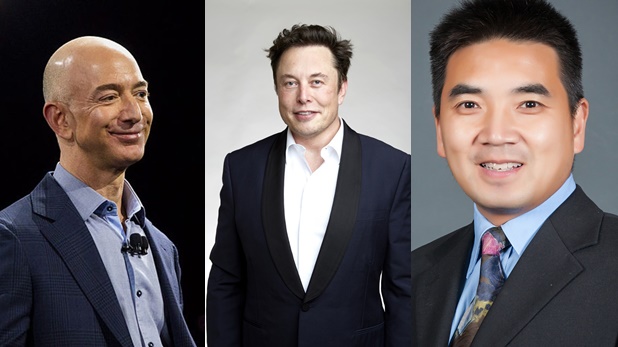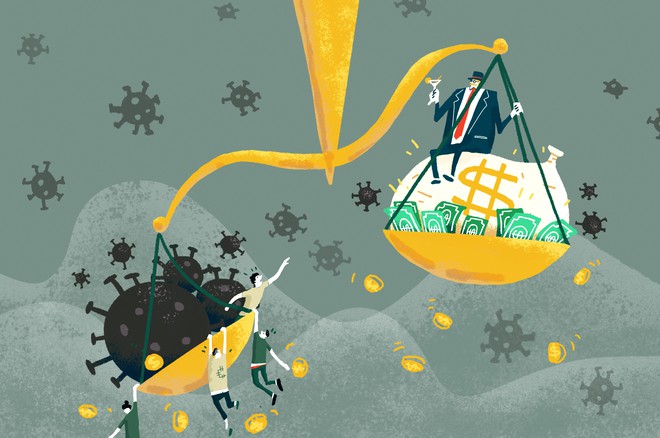US billionaires have pocketed an additional $ 280 billion since the COVID-19 pandemic began
- Tram Ho
Although corona virus itself does not distinguish between those who can be infected and those who do not, the COVID-19 pandemic certainly cannot move the rich-poor balance. During the same period that 22 million Americans lost their jobs, the wealth of the US billionaire class still increased steadily by 10% – or an additional US $ 282 billion compared to the estimate at the beginning of March. Net assets of these “giants” has now reached $ 3,229 trillion.
The stock market crash at the beginning of the pandemic can be a bit confusing for the pocket of billionaires – for example, the net worth of Amazon tycoon, Jeff Bezos, fell to $ 105 billion on December 12. / 3. But then things got back there: on April 15, his net worth increased by $ 25 billion. Eric Yuan, Zoom’s founder and CEO, is one of the few developers who has witnessed a steady increase in net assets even when the market was in trouble, and now his net worth has increased. 2.58 billion USD.

” Beneficiaries of a pandemic ” – as a report from the US Institute for Policy Research – is just a small piece of the wealthy inequality problem in America. Since 1980, taxes paid by billionaires, which are calculated as a percentage of the assets of each owner, have dropped by 79%.
” We are talking about charitable billionaires who share 0.0001% of their wealth with the community in a crisis, but in fact, they have taken advantage of tax laws to reduce taxes for themselves for decades. – that money could have been used to build a better public health system “- Chuck Collins, director of the Program of Inequality and General Benefits at the American Institute for Policy Studies. He also co-authored a report titled “Billionaire Bonanza 2020: Wealth Windfalls, Tumbling Taxes, and Pandemic Profiteers”.
This policy research institute produced the first Billionaire Bonanza report in 2015; Since then, the report has continued to assess the situation of wealth inequality in the United States, each year focusing on different specific factors (for example, the 2018 report on rich empires). ). This year’s report is about billionaires benefiting from the corona virus pandemic. To come up with figures and conclusions, Collins and other co-authors have studied the annual Forbes World Billionaires list, as well as daily watchlists from both Forbes and Bloomberg.

Forbes had to choose a time to get the net asset data for their list, and they chose March 18; The list was completed on 7/4. ” We immediately studied it and realized that, just three weeks later, the story changed quickly, ” Collins said. ” The pandemic really affects billionaires; their wealth decreases compared to last year globally, and in the US, in just three weeks, they surpassed the accumulated wealth last year. and now looking to new milestones . ”
The example of inequality during this pandemic once again highlights some of the perspectives the institute has long made about deep inequality pits and how they are deeply rooted in society. ” Inequality is a pre-existing situation in the United States, ” Collins said. ” When a pandemic happened, the society was already very polarized, and unfortunately we didn’t want it after the pandemic ended, the situation was even more polarized .”
An important finding of the report is that after the 2008 economic crisis, less than 30 months later, the assets of billionaires returned to pre-crisis levels. Their fortunes quickly surpassed their pre-2008 levels. But by 2019, the middle class in the US won’t even recover to their net worth in 2007. ” People are dealing with the pandemic. The economic situation is still affected after the great crisis “- he said.
To address the issue, the authors called for the establishment of a Pandemic Profits Oversight Committee, an Enterprise Transparency Act to prevent asset concealment, and an emergency Millionaire Income Tax Supplement. level 10%, and more.
Collins particularly liked the idea of a Charity Stimulation plan, one that could help transfer about 1.2 trillion dollars that are not being used in private organizations, and another 120 million in Consulting funds, reaching those who really need it. Private organizations are now required to pay only 5% of the tax each year, and that amount may include operating costs; advisory funds are not needed, so there is no incentive for them to transfer money to the charities in need.
” Rich donors have taken advantage of tax breaks, and now the money stays there … If they’re spending money on a rainy day, they should look out the window. It’s raining heavily. nuts “- he said. ” It is time to fulfill the second part of the promise. They have been given tax relief; now they send money to community charities working to solve urgent problems, which are concerned. will be closed due to lack of funding … ”
Some billionaires have donated large amounts of money during the pandemic, but Collins says we cannot allow those charitable acts to make people forget about inequality. ” Charity is really not a replacement for a fair tax system, and a fully funded public safety net, ” – he said.
For millions of Americans struggling to make ends meet, shopping for food, and trying to survive the pandemic, Collins says the pandemic has revealed painful truths about an unequal society. But he also saw that this time period as a wake up. ” The good thing is that most people understand. They really support public policies that can take us in a new direction ,” like taxes on the rich, or progressive inheritance taxes, or even The minimum amount is 15 USD for grocery workers and other workers. ” Our politicians can capture the public when trying to solve this inequality .”
Reference: FastCompany
Source : Genk
